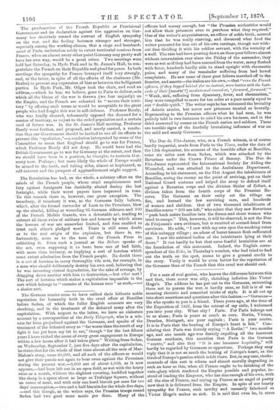The Duc de Fitz-James, who, as a French witness, is
of course hardly impartial, sends from Paris to the Times, under the date of the 12th September, his account of the horrible affair at Bazeilles, some six miles east from Sedan, which was attacked by the Bavarians under the Crown Prince of Saxony. The Due de Fitz-James represented the International Society for Aiding the Wounded, and was attached to the Ambulance Department. According to his statement, on the 31st August the inhabitants of Bazeilles, seeing the enemy on the point of arriving, put on their National Guard costume and helped the army to defend itself against a Bavarian corps and the division Shaer of Erfurt, a division taken from the fourth corps of the Prussian Re- serve. The Germans on their entry set the village on fire, and burned the few surviving men, and hundreds of women and children. Out of two thousand inhabitants of Bazeilles scarce " 300 are left," who relate that they saw Bavarians " push back entire families into the flames and shoot women Who tried to escape." This, however, it will be observed, is not the Due de Fitzjamea's own evidence, but is received at second-hand from survivors. lie adds, "I saw with my own eyes the smoking ruins of this unhappy village ; an odour of burnt human flesh suffocated one. I saw the calcined bodies of the inhabitants lying at their doors." It can hardly be but that some fearful brutalities are at the foundation of this statement. Indeed, the English corre- spondent of the Echo, in Thursday's number, who had tried to find out the truth on the spot, seems to give a general credit to the story. Verily it would be even better for the reputation of the Germans than of the French that this cruel war should end.






























 Previous page
Previous page